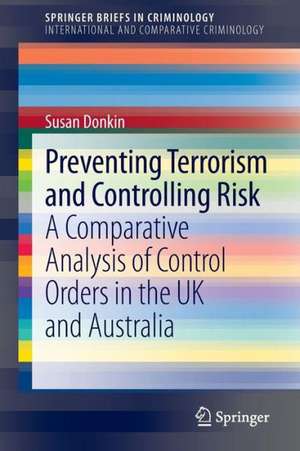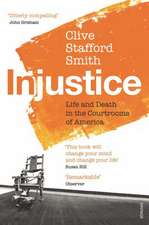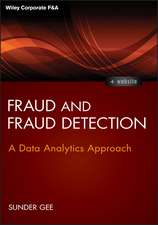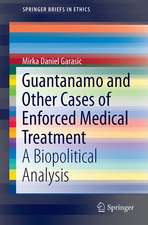Preventing Terrorism and Controlling Risk: A Comparative Analysis of Control Orders in the UK and Australia: SpringerBriefs in Criminology, cartea 1
Autor Susan Donkinen Limba Engleză Paperback – 14 sep 2013
Din seria SpringerBriefs in Criminology
-
 Preț: 356.07 lei
Preț: 356.07 lei -
 Preț: 196.15 lei
Preț: 196.15 lei -
 Preț: 175.58 lei
Preț: 175.58 lei -
 Preț: 377.57 lei
Preț: 377.57 lei -
 Preț: 374.30 lei
Preț: 374.30 lei -
 Preț: 374.30 lei
Preț: 374.30 lei -
 Preț: 374.85 lei
Preț: 374.85 lei -
 Preț: 378.12 lei
Preț: 378.12 lei -
 Preț: 445.49 lei
Preț: 445.49 lei -
 Preț: 374.85 lei
Preț: 374.85 lei -
 Preț: 380.07 lei
Preț: 380.07 lei -
 Preț: 173.25 lei
Preț: 173.25 lei -
 Preț: 378.12 lei
Preț: 378.12 lei -
 Preț: 411.93 lei
Preț: 411.93 lei -
 Preț: 378.54 lei
Preț: 378.54 lei -
 Preț: 372.08 lei
Preț: 372.08 lei -
 Preț: 375.23 lei
Preț: 375.23 lei -
 Preț: 375.45 lei
Preț: 375.45 lei -
 Preț: 375.23 lei
Preț: 375.23 lei -
 Preț: 379.09 lei
Preț: 379.09 lei -
 Preț: 375.07 lei
Preț: 375.07 lei -
 Preț: 343.72 lei
Preț: 343.72 lei -
 Preț: 409.25 lei
Preț: 409.25 lei -
 Preț: 377.35 lei
Preț: 377.35 lei -
 Preț: 376.96 lei
Preț: 376.96 lei -
 Preț: 443.00 lei
Preț: 443.00 lei -
 Preț: 375.07 lei
Preț: 375.07 lei -
 Preț: 378.92 lei
Preț: 378.92 lei -
 Preț: 375.07 lei
Preț: 375.07 lei -
 Preț: 377.57 lei
Preț: 377.57 lei -
 Preț: 376.59 lei
Preț: 376.59 lei -
 Preț: 355.07 lei
Preț: 355.07 lei -
 Preț: 376.43 lei
Preț: 376.43 lei -
 Preț: 376.22 lei
Preț: 376.22 lei -
 Preț: 378.71 lei
Preț: 378.71 lei -
 Preț: 352.97 lei
Preț: 352.97 lei -
 Preț: 374.46 lei
Preț: 374.46 lei -
 Preț: 374.30 lei
Preț: 374.30 lei -
 Preț: 476.79 lei
Preț: 476.79 lei -
 Preț: 376.80 lei
Preț: 376.80 lei -
 Preț: 376.43 lei
Preț: 376.43 lei -
 Preț: 442.62 lei
Preț: 442.62 lei -
 Preț: 411.54 lei
Preț: 411.54 lei -
 Preț: 478.33 lei
Preț: 478.33 lei - 15%
 Preț: 460.57 lei
Preț: 460.57 lei -
 Preț: 413.07 lei
Preț: 413.07 lei -
 Preț: 375.62 lei
Preț: 375.62 lei -
 Preț: 378.71 lei
Preț: 378.71 lei -
 Preț: 410.39 lei
Preț: 410.39 lei -
 Preț: 375.07 lei
Preț: 375.07 lei
Preț: 377.35 lei
Nou
Puncte Express: 566
Preț estimativ în valută:
72.21€ • 75.58$ • 60.10£
72.21€ • 75.58$ • 60.10£
Carte tipărită la comandă
Livrare economică 31 martie-14 aprilie
Preluare comenzi: 021 569.72.76
Specificații
ISBN-13: 9781461487043
ISBN-10: 1461487048
Pagini: 75
Ilustrații: XV, 89 p. 3 illus.
Dimensiuni: 155 x 235 x 17 mm
Greutate: 0.16 kg
Ediția:2014
Editura: Springer
Colecția Springer
Seriile SpringerBriefs in Criminology, International and Comparative Criminology
Locul publicării:New York, NY, United States
ISBN-10: 1461487048
Pagini: 75
Ilustrații: XV, 89 p. 3 illus.
Dimensiuni: 155 x 235 x 17 mm
Greutate: 0.16 kg
Ediția:2014
Editura: Springer
Colecția Springer
Seriile SpringerBriefs in Criminology, International and Comparative Criminology
Locul publicării:New York, NY, United States
Public țintă
ResearchCuprins
Introduction.- Legal Framework.- Criminological Insights.- From Crime Prevention to Crime Pre-emption.- Control Order Case Studies.- Discussion.
Notă biografică
Dr. Susan Donkin is a Lecturer at the School of Criminology and Criminal Justice, Griffith University, as well as an Associate Investigator at the Australian Research Council’s Centre of Excellence in Policing and Security, Australia. Her PhD thesis examined the pre-emptive characteristics of anti-terrorism measures, including control orders and internment, tracing their evolution within several jurisdictions. Her current research interests include Terrorism Prevention and Investigation Measures (TPims) and the use of secret evidence in terrorism cases in the UK. Before moving to Australia, Susan spent several years working in the field of crime prevention, including as a Research Fellow at the Jill Dando Institute of Crime Science, University College London.
Caracteristici
Examines a shift towards pre-emptive crime prevention after 9/11 Draws parallels between British and Australian control order mechanisms and situational crime prevention techniques Analyzes the application of crime risk assessment techniques and their implications











